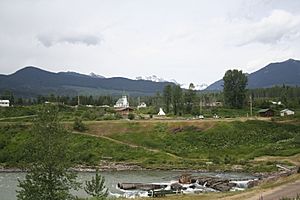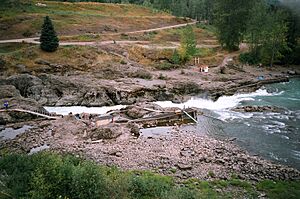Witset facts for kids
Witset, once called Moricetown, is a village in British Columbia, Canada. It's home to the Wetʼsuwetʼen people. The village sits by the Bulkley River on their traditional lands. People have lived here for a very long time, over 5,500 years! The village you see today was built in the early 1900s.
Contents
What's in a Name?
The village's first name was Witset. People left the area after a big rockslide. This slide stopped salmon from swimming up the canyon. The Wet'suwet'en people then moved to Tsë Cakh (Hagwilget). They called their old village Këyikh Wigit.
Later, a missionary named Adrien-Gabriel Morice renamed the village after himself. The church wasn't happy about this.
On May 5, 2018, the community officially changed its name back to Witset. The name Witset means something like "first" or "the people of the first village." This name change happened thanks to Wanda Nikal, a Wet'suwet'en woman. She started a petition to make it happen. In September 2017, the Band Council voted to change the name.
Quick Facts About Witset
- Population: About 815 people live in the village. Another 800 Wet'suwet'en people live in other parts of British Columbia and Canada.
- How it's Governed: The Wet'suwet'en people have a traditional way of governing called the feast system. This is similar to the potlatch ceremonies of other coastal groups. Today, they also have an elected Band Council system.
- Location: Witset is right between Smithers and New Hazelton. It's about 31 kilometers from each town. The village is along the Yellowhead 16 Highway, which follows the Bulkley River Valley. The river flows through a narrow canyon with rushing waterfalls, and there are lots of salmon there.
Culture and Traditions
The people of Witset celebrate their traditional feast system. This system includes five main family groups, or clans: the Big Frog, Small Frog, Beaver, Wolf/Bear, and Fireweed clans.
Sadly, fewer than 15% of people speak the Wet'suwet'en language. Even fewer, less than 5%, understand it without speaking it. The local government is known as the Moricetown Band. They are currently working with the British Columbia Treaty Process to settle land claims.
The culture of the Wet'suwet'en is very important, and people are working to keep it alive. School District #54 (Bulkley Valley) and other groups have helped. They published a textbook called "Niwhts’ide’nï Hibi’it’ën: The Ways of Our Ancestors" for grades 7-12. This book shares their history. Also, the Moricetown Elementary School teaches the Wet'suwet'en language. They also involve community members in their programs to help preserve the culture.
Community Resources
The Witset Multiplex is a large building that holds several important community services. It includes the Band office, a community gym and feast hall, and the school. There is also an office for the Royal Canadian Mounted Police (RCMP) to use when they visit the community.
The Office of the Hereditary Chiefs runs a program called Wet’suwet’en Unlocking Aboriginal Justice (WUAJ). This program works with the Smithers RCMP. Since 1995, the WUAJ Program has offered an alternative justice program. It helps First Nations people who are first-time, non-violent offenders. The WUAJ office is located in the chief's office in Smithers, B.C.
A group called the Witsuwit'en Language Authority has been created by people who speak the language fluently. They are finding new ways to help people who don't speak the language learn it. They are also starting early learning programs in schools and homes.
Local Businesses
- Kyahwood Forest Products JV: This is a large wood and lumber plant, about 58,000 sq ft (5,400 m2). The Band owns 51% of this business, and Northwood Incorporated owns the rest. The plant provides jobs for 75 local people. It can produce a lot of lumber when it's running at full speed.
- Kyah Industries Ltd.: This company is connected to Kyahwood. It gets the first chance to harvest timber from the Band's timber rights. They harvest about 75,500 cubic meters of wood each year. This logging company employs 12 people and owns its own equipment.
- Seasonal craft store: A store that sells crafts at certain times of the year.
Other Wet'suwet'en Communities
Besides Witset, other Wetʼsuwetʼen communities include the Burns Lake Indian Band, Wetʼsuwetʼen First Nation (also known as Broman Lake Band), and Hagwilget Village.



